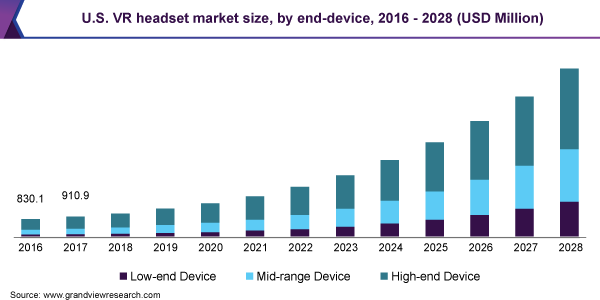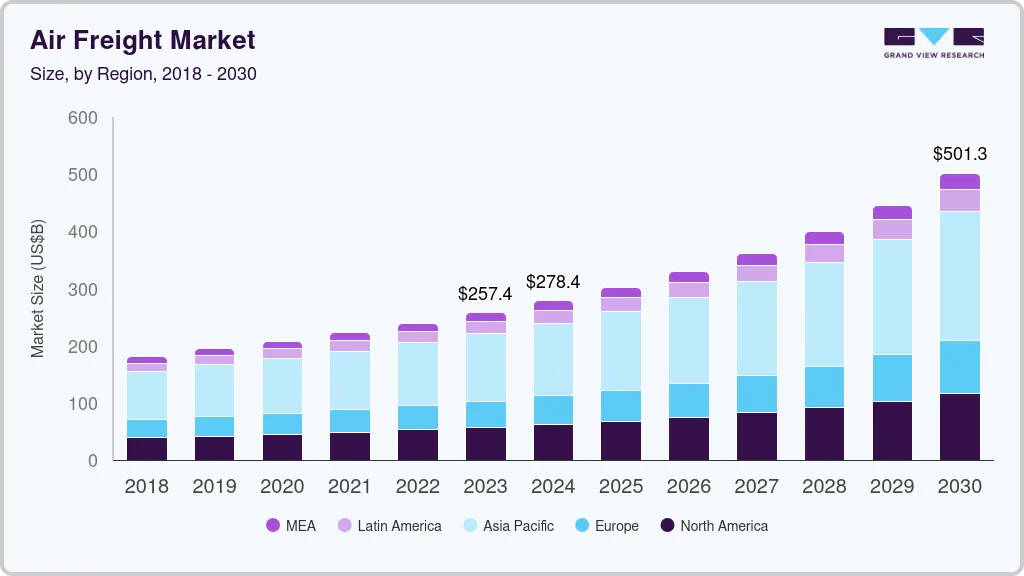Virtual Reality Headset Industry Overview
The global virtual reality headset market size was valued at USD 7.81 billion in 2020 and is expected to grow at a compound annual growth rate (CAGR) of 28.2% from 2021 to 2028. The extensive application of virtual reality (VR) technology in the military and automotive sectors is driving market growth. Moreover, the surge in demand for gaming consoles is another factor propelling the growth of the industry. VR technology has a vast potential to be used in a broad range of applications, such as medical training, industrial prototyping, and education. The rising investments in this technology by enterprises as well as consumers are expected to boost the product demand over the forecast period. The emerging trends in VR technology have an immediate impact on the developments in the VR headset industry, such as the introduction of convenient, attractive, and sleek VR headsets.

In addition, the incorporation of Artificial Intelligence (AI) and machine learning into VR is likely to fuel the product demand. The key players in the industry are continually investing in R&D for the development of state-of-the-art devices. Furthermore, in the wake of Covid-19, corporates have shifted to online platforms to continue their business processes. The increased deployment of VR technology in virtual events, which allows businesses to reach their potential customers in their comfort zones by offering a real-like experience of their products and services, is further driving the growth of the market.
Gather more insights about the market drivers, restraints and growth of the Global Virtual Reality Headset market
The growing product adoption in the gaming and entertainment industries is boosting the demand for VR Head-Mounted Devices (HMDs). Companies are continuously introducing innovative devices to offer immersive entertainment experiences and an unparalleled level of pragmatism within VR games. The main participants in the industry are taking over gaming companies to enhance their product offerings and gain a competitive edge. For instance, in February 2020, Facebook LLC acquired Sanzaru, Inc., a U.S.-based video game development company, to explore the technological benefits for Oculus Studios to develop rich, VR-based content.
The growing trend of the VR domain becoming increasingly social and collaborative, along with the rapid penetration of smartphones, is anticipated to offer various growth opportunities to the market. The benefits offered by VR devices, such as the creation of a realistic world, immersive experience, profound visualization, and accessibility to experience different sites, are boosting the growth of the market. These devices witnessed high demand from various industrial sectors, especially for teaching and learning activities, during the Covid-19 pandemic. For instance, the U.K. government, with the help of VR headsets, trained its trauma medical professionals for the medical procedure. Likewise, the National Aeronautics and Space Administration (NASA) deployed VR technology to provide a Virtual Space Station (VSS), a suite of interactive computer-delivered treatment programs, and interactive behavioral health training.
VR technology has an immense impact on the retail industry owing to the shifting shopping preferences of customers. The technology allows consumers to shop anything from anywhere while offering them an in-store virtual experience. The ability of VR and Augmented Reality (AR) to allow shoppers to try on things virtually has promised the VR headset industry a new growth prospect. The technology fulfills significant needs of the buyers, such as detailed product information and retail-accessibility, along with convenience and fast digital shopping experience. In 2019, Walmart, a global retail company, declared that it would be using 17,000 of Facebook Inc.’s Oculus Go headsets to train its staff in skills extending from customer service to compliance. The staff learned to use the innovative & automated Pickup Tower vending units in simulated settings before they were installed in retail stores. Furthermore, technological expansions and improvements in networking & connectivity are anticipated to boost the product demand over the forecast period.
Browse through Grand View Research's Technology Industry Related Reports
Virtual Reality Market - The global virtual reality market size was valued at USD 21.83 billion in 2021 and is expected to expand at a compound annual growth rate (CAGR) of 15.0% from 2022 to 2030. Virtual Reality (VR) is a digitally produced experience that simulates a three-dimensional environment in the real world.
Artificial Intelligence Market - The global artificial intelligence market size was valued at USD 93.5 billion in 2021 and is projected to expand at a compound annual growth rate (CAGR) of 38.1% from 2022 to 2030.
Virtual Reality Headset Industry Segmentation
Grand View Research has segmented the global virtual reality headset market on the basis of end-device, product type, application, and region:
VR Headset End-device Outlook (Revenue, USD Billion, 2016 - 2028)
- Low-end Device
- Mid-range Device
- High-end Device
VR Headset Product Type Outlook (Revenue, USD Billion, 2016 - 2028)
- Standalone
- Smartphone-enabled
- Standalone PC-connected
VR Headset Application Outlook (Revenue, USD Billion, 2016 - 2028)
- Gaming
- Healthcare
- Media & Entertainment
- Manufacturing
- Retail
- Education
- Telecommunications
- Others
Virtual Reality Headset Regional Outlook (Revenue, USD Million, 2016 - 2028)
- North America
- Europe
- Asia Pacific
- South America
- Middle East and Africa
Market Share Insights:
May 2020: HP Development Company, L.P., a technology firm, unveiled the new Reverb G2 VR headset, built in partnership with Microsoft Corporation and Valve.
February 2020: Facebook LLC acquired Sanzaru, Inc., a U.S.-based video game development company, to explore the technological benefits for Oculus Studios to develop rich, VR-based content.
Key Companies profiled:
Some prominent players in the global Virtual Reality Headset Industry include
- Carl Zeiss AG
- Facebook Technologies, LLC (Oculus)
- Google LLC
- HTC Corporation
- LG Electronics
- Microsoft
- Razer Inc.
- Samsung Electronics Co., Ltd.
- Sony Corporation
Order a free sample PDF of the Virtual Reality Headset Market Intelligence Study, published by Grand View Research.


No comments:
Post a Comment